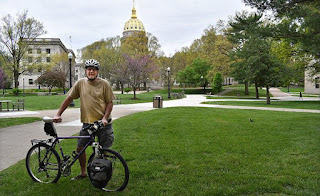Senator Joe Manchin may be doing more than anyone in the United States to perpetuate an obsolete industry: coal mining and energy.
That's not surprising given that he represents West Virginia, the second-leading coal-producing state in the US.
What's also not surprising is that in 2008, when the League of American Bicyclists issued its first reports of states' bicycle-friendliness, the Mountain State ranked dead last. In 2019, when LAB released its last pre-pandemic report, West Virginia had moved up to 34th.
Now it's 28th, right in the middle of the pack. The LAB rates each state in five areas: Infrastructure & Funding, Education & Encouragement, Traffic Laws & Practices, Policies & Programs and Education & Planning. In the first and last categories, WV got a B- and C+, respectively, and a C in each of the other categories. One area in which the state seriously lags behind others is in the percentage of commuters who bike to work: It's about half the national average and, at 47th, near the bottom of the list.
Massachusetts was named the most bike-friendly state. My home state, New York, ranks 13th and, being New York, it ranks very well in most areas but very poorly in others. In Infrastructure & Funding and Education & Encouragement, the Empire State got an A-. In Policies & Programs and Evaluation & Planning, it earned a B+. But on Traffic Laws & Practices, it rates an F+. (As an educator, I have to ask: What's the difference between a D-, which I've given once or twice as a grade, and an F+, which I don't think I've ever given.) I am not surprised, really: If the rest of the state is anything like the NYC Metro area, I can say that the state is doing the things policy makers think they're supposed to do to promote cycling: starting education programs, building lanes and such. But the laws and, more important, law enforcement, have not kept pace: We are one of 11 states without a safe-passing law and we don't have the "Idaho Stop," or any version of it.
Also, I have to say that for all that's been spent on bike lanes, the folks who conceive, plan, design and build them seem to have no better an idea than their counterparts of 50 years ago had about what makes for a good bike lane: It has to be useful, free of hazards and planned so that it's actually safer than riding in traffic. None that I've ridden are structured in a way that a cyclist can cross an intersection without having to worry about being struck by a turning motorist.
On the whole, the LAB's rankings don't surprise me much: After the Bay State, Oregon and Washington rank second and third, respectively. All of the states ranked from 30th to 50th, with the exception of New Hampshire (34th) are south of the Potomac or west of the Mississippi.
Which state ranks last? Wyoming, the nation's leading coal producer.

No comments:
Post a Comment